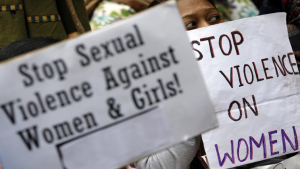By: Maite Nkoana-Mashabane
Genoeg is genoeg!! (Enough is enough). These words reverberated among the community of Eersterust, Tshwane when I visited the De Kock family earlier this week following the gruesome killing of their beloved daughter, sister and mother- Evelyn.
As I walked in the community, I encountered a community united in opposition to Gender-Based Violence(GBV) and femicide. Men and women, young and old members of the Eersterust were emphatic that the pandemic of gender-based violence is inextricably linked with societal ills such as patriarchy; inequality; drug abuse and unemployment amongst others.
The community of Eesterust also described the undeniable link between the surge in the incidence of gender-based violence and the nation-wide lockdown due to the COVID-19 pandemic. In spite of the noble objectives of the lockdown to save the lives of our people from the Corona virus, the lockdown exposed some social ills in our communities, in particular the suffering and oppression of women at the expense of their loved ones, family members and love ones.
The gruesome killing of Evelyn De Kock is but one of the countless cases of gender-based violence and femicide our country experienced over the last few weeks. The heinous nature of this violence against our women defies comprehension.
Recently, our communities are confronted with double-edged sword of the escalating incidents of gender-based violence and femicide as well as effects of the COVID-19 pandemic. Over the last few weeks, at least 21 women and children have been murdered. We have witnessed horrible cases of gender-based violence across our country including the murder of Kgotatso Pula in Ga-Setati Village in Limpopo; Tshegofatso Pule in Roodepoort, Gauteng; Nwabisa Tshaka in Eastern Cape; Naledi Phangindawo in Western Cape and many unknown cases.
I commend the efforts of NGOs working together with the South African Police Services (SAPS) to swiftly identify and arrest almost all alleged perpetrators in these cases of gender-based violence and femicide. Their arrests provide some comfort to families and loved ones who must deal with the brutal reality of losing loved ones is such violent manner.
These killings are too much for us to bear. As a society, we should be ashamed. Gender-based violence in all its forms must be denounced, not just by Government, but also by communities where these perpetrators reside. The perpetrators of gender-based violence are not women, they are family members, brothers, sons, fathers, uncles and fellow community members who many of us know. By standing in silence and not reporting GBV around us, we become bystanders guilty of complicity in criminal cases.
As President mentioned during his address to the nation last Wednesday, we now have the National Strategic Plan “to guide our country’s national efforts against gender-based violence”. In this regard, Government continues to work with civil society in the implementation of the NSP. The Plan is Government and civil society’s multi-sectoral strategic framework to realise a South Africa free from GBVF and follows soon after the Emergency Response Action Plan (ERAP) to combat the GBVF crisis.
The NSP has 6 Pillars that if implemented effectively will surely bring an end to this scourge.
The first Pillar on Accountability, Leadership and Coordination challenges us to hold hands across of all of society to wage a war on this pandemic and hold one another accountable. In the next few weeks, we will launch the National Council for GBV with 51% representation of Civil society and 49% Government that will be well-positioned to lead and coordinate all our efforts. Our Government recognises that we cannot do this alone. As the community of Eesterust argued, GBVF is a societal problem that needs all of us to rally our efforts and resources collectively and confront this enemy head-on.
We are mapping every Ward in the country and as we have done with COVID, we will ‘track and trace’ every suspected case with the assistance of local leaders including Mayors, Faith Leaders, Women’s organisations and NGOs. We are in discussion with technology companies to assist us to make this simpler.
The second Pillar on Prevention remains the most urgent yet the most complex area requiring action by every single one of us to dismantle the deep seated culture of violence against women and children. Our prevention programme will challenge social norms that normalize violence against women. We are engaged with Faith Leaders, with traditional leaders, with Men’s organisations and NGOs that work with them on transformational change. In the next weeks we are planning on establishing local level Community GBV Forums with Women’s Organisations, NGOs, Faith Leaders, Councillors, Social Workers and SAPS to prevent any more killings and cases of GBV in our communities. Every street, every village, every community and every Ward must have a Community GBV Watch Forum.
The third Pillar is on Justice, Safety and Protection and is designed to ensure that all GBV survivors are able to access efficient and sensitive criminal justice that is quick, accessible, responsive and gender-inclusive. As part of the Emergency Response Action Plan for GBV we initiated a Rapid Results programme to fast track Justice and ensure the swift backlog of cases. As President announced, we are looking forward to fast-tracking amendments to legislation related to GBV areas that build on legislative reforms initiated under the ERAP.
The fourth Pillar is Response, Care, Support and Healing, this is the most critical and yet painful pillar as it reflects that we could not prevent the abuse from happening and our daughters, aunts, mothers and grandmothers had to flee from their homes to see protection and shelter outside the place where they should feel safe. To ensure that they are not victimised further by the system, we will ensure that all first respondents are trained. Further, we will strengthen and support community and institutional responses to provide care and support to survivors of gender-based violence and other vulnerable persons.
The fifth pillar of Economic Power is designed to redress the inequality with regards to access to economic opportunities for the majority of the population which is women. We want to ensure that workplaces are safe places for all women and LGBTQI persons and strengthen child maintenance and related support systems to address the economic vulnerability of women. This will include forcing all fathers working for the public sector to pay maintenance for their children. The state cannot continue carrying this double burden of paying for its employees and their children.
In the future we will ensure that the sixth Pillar on Research and Information management seeks to make us understand what type of people are these who believe that the only way they can make their partners to understand them is to beat them or even kill them. There is no culture or religion that promotes violence against women and children in our country has reached endemic proportions. Therefore, we want to understand interventions that have worked in order to infuse them in our policies to eradicate gender-based.
Maite Nkoana-Mashabane is Minister of Women, Youth and Persons with Disabilities.






